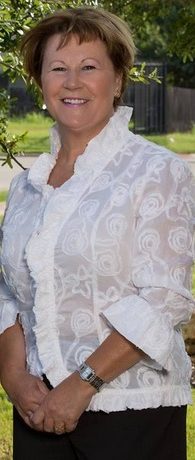Share On Social!
Growing up in Spain, Dr. Marta Katalenas ate home-cooked meals made with fresh ingredients.When she moved to the United States in 1984 to learn English and become a pediatrician, she saw a different way of life that included way more treats, especially sugary juices and drinks. As she began her practice, she said she saw a growing association between kids drinking too much sugar and being overweight. Dr. Katalenas decided that if she was going to help parents set their kids on a path of health, she needed to get the whole community involved in reducing sugary drink consumption—so she made reducing sugary drinks part of her new monthly health challenge for families.
EMERGENCE

Source: https://www.facebook.com/drkatalenas/photos/pb.312244655316.-2207520000.1396360621./10153683815250317/?type=3&theater
Awareness: Spain native Dr. Marta Katalenas, who moved to the U.S. in 1984 and became a board-certified pediatrician, founded the Pediatric Center of Round Rock just north of Austin, Texas, in 1996.
As a pediatrician for over 25 years, she has seen firsthand the rise of obesity among her patients, especially her Latino patients.
“Hispanics make up 39% of the adult population with obesity,” Katalenas said.
She feels a responsibility to make sure the next generation does not follow this obesity trend.
According to her, the amount of sugary drinks young kids consume, especially juice, is a huge roadblock to raising healthy children.
“Every toddler that comes into my office comes with a sippy cup of juice,” she said. “When you go to the park, all the mothers come with a sippy cup with juice.”
Research mirrors her experience. In a research review of Latinos and sugary drinks, one study found that 74% of Latinos have consumed some sugar-sweetened beverage by age 2.
Learn: Katalenas said two big problems emerge when young children drink too much sugary drinks.
One is the extra calories. Growing kids need a certain amounts of calories, but the “empty” calories in sugary drinks come from added sugars, which offer few or no nutrients—and they add up fast.
The bigger, more urgent problem, said Katalenas, is the habit kids are forming when they rely on sugary drinks as their main beverage.
“Your brain gets trained to always crave something sweet,” she said.
And this has major implications for the future.
“The kids we are training today are the ones who are going to drink soda tomorrow,” and other sugar beverages in excess, a habit that can lead to diabetes and other diet-related illnesses, she said.
Katalenas said many parents are unaware of the sugar content in fruit juice.
She said parents think: “If I water the juice down, it’s better.” But watering juice down doesn’t prevent kids from getting hooked and craving sweetened drinks.
Also, parents, especially new moms, can be misinformed about sugary drinks by the Internet, neighbors, family traditions, and the media, Katalenas said.
Current Women, Infant, and Children (WIC) food benefits allows juice. With sugary juices often marketed as “100% natural” or “fortified with vitamin C,” it’s easy to understand how parents can be lead astray, Katalenas said.
“Parents get confused,” she said. “Our only hope… is to change our culture.”
Frame Issue: When Katalenas sees an overweight patient, she talks with the family about a nutrition and diet plan. Nothing too detailed; she said she makes sure it is a plan that she herself could follow.
But more often than not, her message wouldn’t get through.
“They would come back, and they had done nothing,” said Katalenas.
Given all the twisted information about sugary drinks, she decided to organize some activities and educational outreach to teach the truth about sugary drinks and improve patients’ health.
DEVELOPMENT
Education/Mobilization: Katalenas began printing out nutrition guides and handing them out to parents during all typical doctor’s visits, as well as placing them around the office.

She also began making healthy eating and drinking presentations at the local PTA as part of her off-duty volunteer work as an active member of Round Rock Independent School District’s School Health Action Committee (SHAC).
She even published a book with her sought-after nutrition advice, The Step-Up Diet, in 2012.
Katalenas said she finds repetition is best: “We need to all be talking about it.”
She even mobilized her patients by organized her office’s first Kids Fitness Fun Day, a day in September dedicated to community health in a kid-friendly environment. At the event, participants could complete the Kids Fitness Fun Day station challenge—basic-level fitness games suited for all ages. In addition, each fitness station is run and sponsored by a local health-related business, allowing parents to discover beneficial family resources throughout the community. In an effort to encourage team work and physically active hobbies, there are also a variety of local dance groups performing, along with free fitness and karate classes for participants to enjoy.
The 2013 event was a great success, and plans are in the works to do it again in 2014.
But Katalenas still looked for better ways to reach patients in a simple, memorable, long-term way.
Debate: In late 2013, with 2014 approaching, Katalenas wanted to help her patients start of the New Year excited about making healthy changes.
But she was wary of encouraging them to make overly ambitious New Year’s resolutions.
“Since 45% of people make resolutions, but only 8% actually keep them, re-thinking how we plan to accomplish our health goals is critical,” she said.
At the start of 2013, Katalenas and her staff had issued monthly resolutions, with each month focused on a different healthy practice families can do together. Some months are focused around exercising, and some are focused on eating better, with the hope that by the end of the month, the practice will become a habit.
Katalenas and her staff were going to do the month-by-month resolutions again in 2014.
Now the question was: would her patients be up for month-to-month resolutions, too, and what resolution would be challenging but reasonable enough to get families drinking fewer sugary drinks?
ENACTMENT
Activation/Frame Policy: There are many ways to encourage families to drink fewer sugary drinks.
Katalenas said she didn’t want the challenge to be: “drink X number of glasses of water a day,” because bodies differ on how much water they need based on activity, age, and other factors.
Having families commit to stop buying sugary drinks for the entire month, because they don’t provide any essential nutrients, seemed
like a more reasonable challenge. She also said the limited time frame may make the challenge more doable for some.
“Sometimes psychologically if you know something’s going to be just for a limited amount of time you are more likely to engage,” she said. “And they say if you do something for 30 days it forms to part of your life; that’s what my hope is.”
Change: Dr. Katalenas launched her monthly health challenges for patients in January 2014.
March 2014 became the sugary drinks challenge month.
“This month,” Katalenas announced on her blog, “we challenge you to stop buying the sodas and sugary drinks at the grocery store.”
A printable flyer with all 12 challenges listed can be found on Katalenas’s website. She said families love that they can just print it off and stick it on the fridge as a reminder.
IMPLEMENTATION
Implementation: The challenge was pushed out through her blog, social media and a press release. It is continuing to be picked up by other media outlets, as well.
These days, when Katalenas asks her patients what they should be drinking, the kids who have been with her a while always list healthy drinks, like milk and water.
“This is so engrained into my patients’ brains,” she said.
Equity/Sustainability: Whenever Katalenas or her staff gets a new healthy recipe idea, she makes sure it ends up on the blog for everyone to see.
“Even the parents themselves give us ideas,” she said.
When parents come to her with questions that have answers that she thinks could benefit the community, she writes a blog post on it. It’s this sort of sharing of information that Katalenas believes will begin to reverse the childhood obesity trend.
And Katalenas plans to continue to spread information about good nutrition habits as long as people will listen. To her, good information getting to parents and kids is crucial.
“We have to be sharing the same belief, and we really don’t have much time.”
This success story was produced by Salud America! with support from the Robert Wood Johnson Foundation.
The stories are intended for educational and informative purposes. References to specific policymakers, individuals, schools, policies, or companies have been included solely to advance these purposes and do not constitute an endorsement, sponsorship, or recommendation. Stories are based on and told by real community members and are the opinions and views of the individuals whose stories are told. Organization and activities described were not supported by Salud America! or the Robert Wood Johnson Foundation and do not necessarily represent the views of Salud America! or the Robert Wood Johnson Foundation.
ABOUT THE PROGRAM
Salud America! The RWJF Research Network to Prevent Obesity Among Latino Children is a national program of the Robert Wood Johnson Foundation. The program aims to educate researchers, decision-makers, community leaders, and the public in contributing toward healthier Latino communities and seeking environmental and policy solutions to the epidemic of Latino childhood obesity. The network is directed by the Institute for Health Promotion Research at the University of Texas Health Science Center at San Antonio.
For more information, visit http://www.salud-america.org.
By The Numbers
74
percent
of Latino kids have had a sugary drink by age 2 (vs. 45% of white kids)
This success story was produced by Salud America! with support from the Robert Wood Johnson Foundation.
The stories are intended for educational and informative purposes. References to specific policymakers, individuals, schools, policies, or companies have been included solely to advance these purposes and do not constitute an endorsement, sponsorship, or recommendation. Stories are based on and told by real community members and are the opinions and views of the individuals whose stories are told. Organization and activities described were not supported by Salud America! or the Robert Wood Johnson Foundation and do not necessarily represent the views of Salud America! or the Robert Wood Johnson Foundation.



